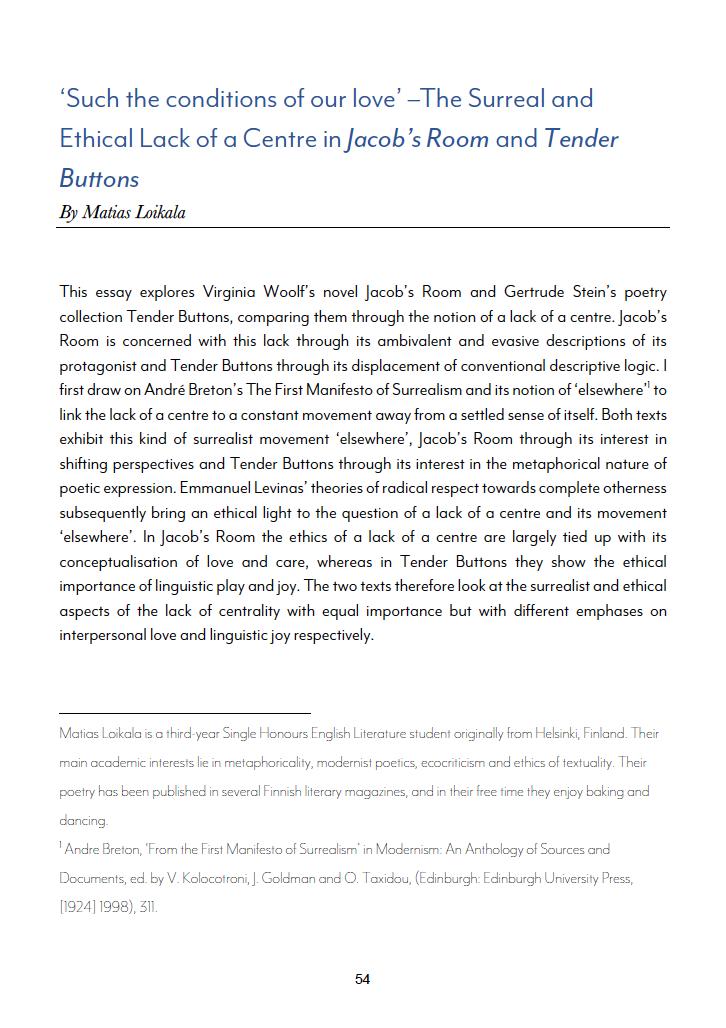‘Such the conditions of our love’
The Surreal and Ethical Lack of a Centre in Jacob’s Room and Tender Buttons
DOI:
https://doi.org/10.36399/GroundingsUG.12.160Keywords:
Virginia Woolf, Jacob's Room, Gertrude Stein, Tender Buttons, Lack of Centre, Surrealism, OthernessAbstract
This essay explores Virginia Woolf’s novel Jacob’s Room and Gertrude Stein’s poetry collection Tender Buttons, comparing them through the notion of a lack of a centre. Jacob’s Room is concerned with this lack through its ambivalent and evasive descriptions of its protagonist and Tender Buttons through its displacement of conventional descriptive logic. I first draw on André Breton’s The First Manifesto of Surrealism and its notion of ‘elsewhere’ to link the lack of a centre to a constant movement away from a settled sense of itself. Both texts exhibit this kind of surrealist movement ‘elsewhere’, Jacob’s Room through its interest in shifting perspectives and Tender Buttons through its interest in the metaphorical nature of poetic expression. Emmanuel Levinas’ theories of radical respect towards complete otherness subsequently bring an ethical light to the question of a lack of a centre and its movement ‘elsewhere’. In Jacob’s Room the ethics of a lack of a centre are largely tied up with its conceptualisation of love and care, whereas in Tender Buttons they show the ethical importance of linguistic play and joy. The two texts therefore look at the surrealist and ethical aspects of the lack of centrality with equal importance but with different emphases on interpersonal love and linguistic joy respectively.
References
Breton, Andre. ‘From the First Manifesto of Surrealism.’ in Modernism: An Anthology of Sources and Documents, ed. by V. Kolocotroni, J. Goldman and O. Taxidou, 307-311. Edinburgh: Edinburgh University Press, [1924] 1998.
Bromley, Amy. ‘Virginia Woolf’s Surrealist Situation of the Object.’, Virginia Woolf Miscellany, No 85, Spring 2014: 21-23.
Eagleton, Terry. Literary Theory: An Introduction. Anniversary ed. Oxford: Blackwell, 2008.
Hand, Seán. Emmanuel Levinas. Abingdon: Routledge, 2009.
Hollander, Rachel. ‘Novel Ethics: Alterity and Form in Jacob’s Room.’, Twentieth-Century Literature, volume 53, 1/2007: 40-66.
Mildenberg, Ariane. ‘Seeing Fine Substances Strangely: Phenomenology in Gertrude Stein’s Tender Buttons.’, Studia Phaenomenologica, 8/2008: 259-282.
Stein, Gertrude. Tender Buttons. New York: Dover, [1914] 1997.
Walker, Jayne L. ‘Tender Buttons: The Music of Present Tense.’ in The Making of a Modernist: Gertrude Stein from ‘Three Lives’ to ‘Tender Buttons’. Amherst: University of Massachusetts Press, 1984.
Woolf, Virginia. Jacob’s Room. Oxford: Oxford University Press, [1922] 1992.

Downloads
Published
Issue
Section
License
Copyright (c) 2019 Matias Loikala

This work is licensed under a Creative Commons Attribution 4.0 International License.
The CC BY 4.0 license is a Creative Commons license. This is a non-copyleft free license that is good for art and entertainment works, and educational works. It is compatible with all versions of the GNU GPL; however, like all CC licenses, it should not be used on software. People are free to: Share — copy and redistribute the material in any medium or format; Adapt — remix, transform, and build upon the material for any purpose, even commercially. The licensor cannot revoke these freedoms as long as you follow the license terms. But they must conform to the following terms: Attribution — You must give appropriate credit, provide a link to the license, and indicate if changes were made. You may do so in any reasonable manner, but not in any way that suggests the licensor endorses you or your use. No additional restrictions — You may not apply legal terms or technological measures that legally restrict others from doing anything the license permits.
Please check individual article PDF copies to see if any additional restrictions apply.







